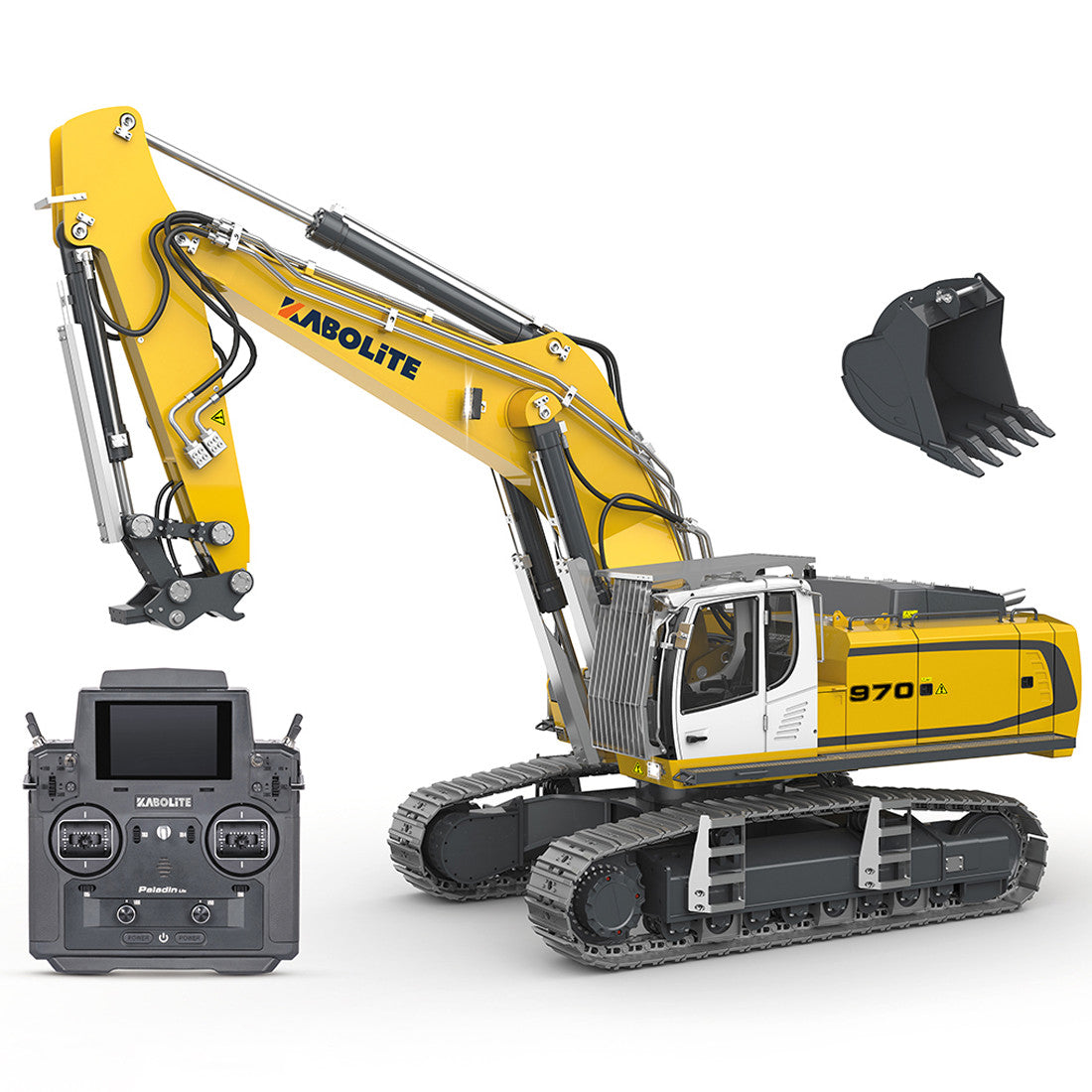Recognizing Just How Excavator Functions and Its Effect on Effectiveness
Excavators play a vital function in construction and mining procedures, counting on a complex interaction of mechanical and hydraulic systems. Their capacity to execute a range of tasks pivots on both their design and the technology incorporated within. Recognizing these components can significantly impact operational performance and performance. As improvements remain to reshape the industry, one have to think about exactly how these changes will certainly influence future practices and efficiency.
The Essentials of Excavator Mechanics

The Function of Hydraulic Solutions in Excavators
At the heart of excavator operation exists the hydraulic system, which plays a crucial duty in powering the equipment's features and movements. This system utilizes pressurized hydraulic fluid to transfer power, enabling different activities such as swinging, lifting, and excavating. By taking advantage of the concepts of hydraulics, excavators can execute tasks with remarkable precision and force, improving general functional efficiency.The hydraulic system is composed of key components, including pumps, cyndrical tubes, and shutoffs, which collaborate to manage the circulation and instructions of the liquid. When the driver involves the controls, the hydraulic liquid is directed to specific cylinders, converting the operator's commands right into physical movement. This device permits responsive and smooth actions, which are important in building and construction and excavation settings. double e volvo rc excavator. The performance of the hydraulic system straight affects the efficiency and adaptability of the excavator, making it a vital component in modern excavation processes
Key Components of an Excavator
Recognizing the key parts of an excavator is vital for grasping just how this effective device runs. An excavator consists of several considerable components, consisting of the undercarriage, home, bucket, boom, and arm. The undercarriage gives stability and mobility, commonly featuring tracks or wheels to browse various terrains. The home contains the engine and hydraulic systems, permitting the operator to regulate movement and power the maker. The boom expands from the house, allowing vertical reach, while the arm attaches to the bucket, assisting in excavating and lifting operations.Additionally, the taxi houses the driver, outfitted with controls for precise handling. Each of these parts plays an essential duty in the excavator's overall performance, adding to its performance and performance on building sites. Understanding these components helps in enhancing and maintaining excavator performance, making certain tasks are finished securely and effectively.
Accessory Flexibility and Its Benefits
Attachment flexibility is an important facet of excavators, enabling operators to switch over in between different devices tailored for certain tasks. This adaptability not just boosts job efficiency however likewise adds to cost-effectiveness by reducing the requirement for several devices. Comprehending the various kinds of accessories offered can substantially influence the overall efficiency and capability of an excavator on job websites.
Kinds of Add-ons
While excavators are largely recognized for their excavating abilities, their true convenience depends on the vast selection of accessories readily available. These attachments boost the excavator's performance, enabling it to carry out different tasks beyond excavation. Common attachments include buckets (for excavating and scooping), hydraulic thumbs (for comprehending materials), and augers (for drilling holes) Grapples are made use of for relocating and managing particles, while rippers can break up hard surfaces. Various other specialized accessories, such as trenchers and plows, enable excavators to adjust to particular job requirements. This variety not only boosts the device's utility throughout different industries, including building and construction, landscaping, and demolition, but additionally permits drivers to tailor their tools to meet particular task demands effectively.
Raised Job Performance
Making the most of job effectiveness is a primary benefit of utilizing different excavator attachments. Various attachments enable an excavator to perform numerous tasks without requiring to change tools, saving valuable time and labor. For example, utilizing a hydraulic hammer can break concrete while a container attachment can dig deep into dirt, allowing a seamless process. This adaptability minimizes downtime related to tools modifications and improves performance on-site. In addition, specialized add-ons improve accuracy in tasks such as grading or landscape design, bring about higher top quality outcomes. The capability to adjust to numerous work needs not just enhances procedures however likewise lessens the demand for added equipment, making certain that projects are finished promptly and effectively. In general, accessory flexibility significantly contributes to increased task effectiveness in excavation work.
Cost-Effectiveness and Flexibility
Cost-effectiveness is a significant advantage of utilizing functional excavator accessories. These accessories permit a solitary excavator to do numerous jobs, lowering the demand for additional equipment and labor - double e volvo rc excavator. By switching over between buckets, hammers, and grapples, drivers can take on numerous jobs, from digging to demolition, thus making the most of devices utilization. This flexibility not just lowers functional expenses but additionally minimizes downtime connected with altering tools. Furthermore, the ability to tailor excavators with specialized attachments improves efficiency, as they can effectively handle diverse tasks according to task demands. In conclusion, the mix of cost-effectiveness and flexibility in excavator add-ons adds to boosted operational effectiveness and resource allowance in building and construction and excavation projects

Advanced Innovation in Modern Excavators
Modern excavators are increasingly furnished with sophisticated technology that changes excavation procedures. Automation enhances operations, while enhanced More Info gas effectiveness minimizes operational costs. Additionally, wise control systems improve accuracy and security, marking a substantial development in excavation equipment.
Automation in Excavation Processes
As excavation technology evolves, automation has actually emerged as an essential part in improving efficiency and accuracy on job websites. Modern excavators are equipped with innovative automated systems that help with jobs such as grading, digging, and trenching with marginal operator treatment. These systems make use of sensors, GPS, and equipment knowing formulas to ensure exact positioning and deepness control, greatly minimizing the margin for error. Additionally, automation allows operators to concentrate on calculated decision-making as opposed to hand-operated controls, resulting in improved performance on the whole. Such innovations not just improve operations but likewise boost safety by lessening human error in complicated procedures. Consequently, the combination of automation in excavation procedures stands for a considerable advancement in building innovation, driving the sector in the direction of higher efficiency and efficiency.
Boosted Fuel Effectiveness
Developments in technology have actually also led to substantial enhancements in fuel efficiency for contemporary excavators. Modern devices are outfitted with sophisticated engines that optimize power result while reducing fuel consumption. These engines make use of cutting-edge burning modern technologies, such as turbocharging and straight fuel shot, to improve performance and performance. Furthermore, light-weight materials in building decrease total weight, permitting much less energy expenditure during operation. The introduction of variable speed controls enables operators to change engine performance according to certain jobs, better minimizing gas usage. Consequently, these improvements not just lower functional expenses however also add to ecological sustainability by decreasing emissions. On the whole, improved fuel performance in excavators is a crucial advancement that reinforces productivity and financial practicality in the construction sector.
Smart Control Solution
While operators browse significantly intricate task websites, wise control systems in excavators have arised as vital tools for enhancing performance and accuracy. These sophisticated technologies make use of algorithms and sensing units to keep an eye on various specifications such as load weight, surface problems, and operational efficiency. By instantly changing hydraulic features, wise systems maximize device efficiency, causing boosted efficiency and decreased endure components. Additionally, operators take advantage of user-friendly interfaces that supply real-time responses and diagnostics, enabling educated decision-making. This integration of innovation not only streamlines procedures however additionally minimizes human error, adding to more secure workplace. As the building sector proceeds to evolve, smart control systems will certainly play an essential duty fit the future of excavator efficiency and efficiency.
Enhancing Functional Efficiency With Excavators
Excavators play a crucial role in improving functional effectiveness across various building and construction and excavation jobs. Their flexibility allows for several jobs, consisting of digging, training, and product handling, which improves operations and reduces the demand for added equipment. With effective hydraulic systems, excavators can perform sturdy jobs with precision, substantially decreasing the time needed to complete projects. The integration of advanced modern technology, such as general practitioner and automated controls, better maximizes their procedure, making it possible for drivers to accomplish greater accuracy and lower material waste. In addition, contemporary excavators are developed to take in less gas and lessen discharges, contributing to both price financial savings and ecological sustainability. By making use of excavators successfully, construction groups can improve productivity, fulfill job deadlines, and boost general website administration. This multifunctionality and efficiency make excavators indispensable devices in the click resources contemporary construction landscape.
The Future of Excavators in Building And Construction and Mining Industries
As the construction and mining sectors develop, the future of excavators is positioned for considerable transformation driven by technical development and transforming operational needs. Advances in automation and expert system are improving excavator abilities, enabling for boosted precision and performance in operations. Self-governing excavators are arising, minimizing the demand for human intervention and decreasing the threat of accidents.Moreover, the combination of telematics and IoT innovation allows real-time monitoring of device performance and anticipating upkeep, maximizing uptime. Environmentally friendly styles, consisting of electrical and hybrid models, are getting grip, aligning with sustainability goals within the industry.Additionally, using innovative materials and lighter styles boosts fuel effectiveness while keeping efficiency standards. As these patterns progression, excavators will certainly play an important function in fulfilling the enhancing demands for performance and safety and security in construction Web Site and mining, ultimately transforming functional landscapes.
Frequently Asked Inquiries
How Do Weather Impact Excavator Performance?

Weather condition conditions considerably affect excavator efficiency, as rainfall and mud can hinder traction and security, while severe temperature levels might affect hydraulic systems. Operators should adjust to these variables to assure excellent capability and safety and security during operations.
What Precaution Should Operators Follow While Making Use Of Excavators?
Security steps for excavator operators consist of wearing ideal personal protective devices, carrying out pre-operation examinations, making sure proper interaction with ground workers, maintaining a secure range from above threats, and adhering to established functional methods to stop accidents.
Exactly How Frequently Should Excavators Be Kept for Optimum Efficiency?
Excavators must be maintained consistently to assure peak performance, generally every 250 operating hours or as defined by the producer. Regular checks enhance dependability, stop unanticipated break downs, and prolong the lifespan of the devices.
What Is the Ordinary Lifespan of an Excavator?
The typical life-span of an excavator generally ranges from 10,000 to 15,000 hours of operation. Aspects affecting longevity include maintenance methods, running problems, and the top quality of the machine itself, impacting general performance and performance.

Can Excavators Operate on Unequal Surface Efficiently?
Excavators can operate properly on uneven terrain because of their expressed layouts and adjustable tracks. These attributes allow them to keep security and traction, enabling reliable operation in challenging atmospheres generally come across in building and construction and landscape design tasks. Each of these parts plays an essential function in the excavator's total functionality, adding to its efficiency and performance on construction sites. Maximizing job efficiency is a primary benefit of making use of various excavator attachments. While drivers browse significantly intricate task sites, smart control systems in excavators have emerged as vital devices for improving efficiency and accuracy. Excavators play an important function in improving functional effectiveness throughout numerous building and construction and excavation tasks. Advances in automation and man-made knowledge are reshaping excavator capabilities, allowing for enhanced precision and efficiency in operations.
Comments on “What You Need to Know About Using a rc excavator for Demolition Tasks”